A Guide to the Cost of Private Tutors
Why Does the Cost of Tuition Vary So Much?
 According to prospects.ac.uk after-school tutors in the UK charge from around £20-£60 per hour in 2025. Of course all of this will depend on a great deal? Is the tutor qualified? Does the tutor have experience with children? What qualifications does the tutor have in the subject and what exams (if any) is the child working towards? It would be quite normal to pay £65 per hour for GCSE tuition and much more than that for the best 11+ tutors in London say! (Tutorfair.com have prices of over £100 per hour for specialist 11+ tutors/entrance exam tutors)
According to prospects.ac.uk after-school tutors in the UK charge from around £20-£60 per hour in 2025. Of course all of this will depend on a great deal? Is the tutor qualified? Does the tutor have experience with children? What qualifications does the tutor have in the subject and what exams (if any) is the child working towards? It would be quite normal to pay £65 per hour for GCSE tuition and much more than that for the best 11+ tutors in London say! (Tutorfair.com have prices of over £100 per hour for specialist 11+ tutors/entrance exam tutors)
So why is there so much variation?
What Makes Some Tuition More Expensive?
Does The Fee Include Overheads?
Some tutors work from home or will visit the student’s home, so may have travel expenses which are high at the moment. Some tutors work from a centre, so they have to pay overheads such as power, rent and rates. The resources and working environment may be better but it will cost a little more.
How Experienced and Qualified are the Tutors?
This is probably the biggest variable as tutors do not have to be qualified to offer their services. Some tutors may have a degree in the subject they are teaching and some tutors may have teaching qualifications and classroom experience in schools, so will expect to be better paid.
Does the Tutor Pay VAT?
Tutors do not have to pay VAT on the private tutoring they do if they are self-employed. Companies will need to pay this tax however if they go over the VAT threshold. The government have recently changed the law on this as some agencies were avoiding VAT, now they will all have to pay it too.
have recently changed the law on this as some agencies were avoiding VAT, now they will all have to pay it too.
What Education Level or Exam is the Student Aiming For?
Generally the higher the level of qualification the student is studying for the fewer tutors will be qualified to teach that subject. If you are studying for a maths degree, for example, it will be more expensive to hire a tutor. The tutor will have to be more experienced and qualified themselves and the lessons will take longer to prepare, therefore they will charge more.
What Makes Some Tuition Less Expensive?
The Number of Students in a Group
One way to reduce costs is to teach more students at a time. This may lead to a less individualised lesson if the planning is not well organised.
What Is the Preparation Time?
Using standard resources and computer programmes is a way to reduce costs. This reduces the preparation time for tutors and so reduces the amount of time spent on each lesson, before and after. Some companies use AI computer resources which respond to the child’s progress so the tutor does not need to do any planning.
Online or In Person?
Online tutoring can provide services anywhere which increases the supply of tutors and therefore reduces the cost. For example, they could be from another country with lower wage costs.
 Why are some tuition companies more expensive?
Why are some tuition companies more expensive?
Generally, the more qualified and experienced the tutors are, the higher the fees are going to be. Some tutors will charge more because, even though they may not pay VAT or have to pay wages, they may have built up a reputation that allows them to increase their fees. Also, in some regions there is a lot of competition for independent school places and therefore a lot of demand for 11+ tutors. This drives up prices.
Why are some tuition companies cheaper?
Some ‘tuition centres’ do not employ fully qualified tutors, in fact some may just be enthusiastic graduates or less. Some education businesses do not actually teach the children but allow the computer AI to teach them. If a tutor lacks experience and qualifications, teaches online or doesn’t have to travel far, they are likely to charge a lower fee.
I Love to Learn Professional Tuition-Where do we fall?
We only employ fully qualified and experience teachers to be tutors here at I Love to Learn. This means that we don’t even interview anyone unless they have QTS (qualified teacher status). We also expect tutors to have a number of years of actual classroom experience.
We run dedicated education centres which means we have to pay overheads. It does give us the advantage of having all our resources in one place and the ability to run tuition in small groups. For those reasons our frees of £48 for each 80 min session, which works out at only £36 per hour, and we think is great value. We also think the teaching environment, the excellent computer/non-computer resources and the fun of small group learning make our tutoring a really high quality product.
Administrator (Part Time)
Administrator (Part/Time)
Summary
A part-time administrator is required to help support the thriving I Love to Learn Professional Tuition after-school tuition centres; in Havant, Fareham and Portsmouth. Hours are flexible during daytime or early evening.
Communication
- Internal-e.g. emails and calls to customers
Missed sessions and catch up sessions
- External-e.g. letter and emails to schools
Finance
- Recording payments-non-automatic
- Following up late payments
- Updating financial records
Data Management
- Keeping Calendar and database up to date
- Updating management data
Qualifications and Education Requirements
DBS cleared
Customer service skills
Ability to work independently
Verbal communication skills
Attention to detail
Numeracy and literacy skills
Salary and Hours
Hours to be negotiated, but minimum of 6 hours a week initially
£10.50 per hour (depending on experience)
How Qualified Does A Tutor Need To Be?
Is Your Tutor Qualified?
 The short answer is, not at all. Anyone can call themselves a tutor without any qualifications or experience. It is up to parents to ask and decide what qualifications they would prefer. Well-qualified tutors, with classroom experience and a proven track record, are, of course, desirable. However, for highly motivated students, someone who is enthusiastic about their subject but not a qualified teacher may be a successful tutor. Generally, for children who are falling behind or have special needs, parents should actively seek tutors who possess specific skills tailored to their needs. This can often be achieved through the tutor’s experience working with similar cases or in specialized areas. It is important to note that while qualifications and experience are typically important benchmarks, a tutor’s dedication, passion, and ability to connect with the student on a personal level can also significantly contribute to successful tutoring outcomes. Therefore, parents should consider both the credentials and personal qualities of potential tutors when making their selection, ensuring the best fit for their child’s unique educational requirements.
The short answer is, not at all. Anyone can call themselves a tutor without any qualifications or experience. It is up to parents to ask and decide what qualifications they would prefer. Well-qualified tutors, with classroom experience and a proven track record, are, of course, desirable. However, for highly motivated students, someone who is enthusiastic about their subject but not a qualified teacher may be a successful tutor. Generally, for children who are falling behind or have special needs, parents should actively seek tutors who possess specific skills tailored to their needs. This can often be achieved through the tutor’s experience working with similar cases or in specialized areas. It is important to note that while qualifications and experience are typically important benchmarks, a tutor’s dedication, passion, and ability to connect with the student on a personal level can also significantly contribute to successful tutoring outcomes. Therefore, parents should consider both the credentials and personal qualities of potential tutors when making their selection, ensuring the best fit for their child’s unique educational requirements.
Qualifications to look out for:
Degrees such as BSc (Science Degree), BA (Arts Degree), MA (Advanced Degree), PhD (Very Advanced Degree).
Teaching Qualifications, PGCE (Teaching Qualification), BEd(Education Degree), GTP (On the Job teacher training) -These all lead to if teachers complete a Newly Qualified Teachers year of experience (NQT) QTS (Qualified to teach in UK schools),
Many private tutors have qualified teaching status (QTS) although you don’t need to be a qualified teacher to be a private tutor. Some teachers tutor as a sideline to their classroom teaching job and some become private tutors after retirement.
Rest assured that, at I Love to Learn Professional Tuition, all our tutors have a teaching qualifications (QTS) and lots of classroom and tutoring experience. We give full training and our centres are all OFSTED registered. We are also members of The Tutors’ Association which is a professional body.
Teach your child Handwriting-getting started
In this video I explain how to write lower case letters. At I Love to Learn Professional Tuition we teach cursive (or joined up) writing right from the beginning. I start with writing letters that begin with vertical strokes e.g. i, t, l, p and m This is suitable for parents wishing to help their child with the basics of joining up ( cursive) handwriting. However, it can also be used by all those who would like to improve their handwriting style.
Teach Your Child Fractions-Improper Fractions and Mixed Numbers
In this video I explain how to convert improper fractions into mixed numbers. This is a topic that can often cause confusion, mainly because of the terms being used. I suggest that it is usually helpful to draw a diagram of the improper fraction or mixed number that you are trying to convert.
This is suitable for parents wishing to help their child with topics they may have forgotten.
Click here to download the worksheets…..
To find out more about how we teach maths click here.
Writing Competition Prize Giving
Saturday 28th October
Thank you all for coming to the very enjoyable event. Many thanks to Justin Strain (local author) for judging for us is such a generous way.



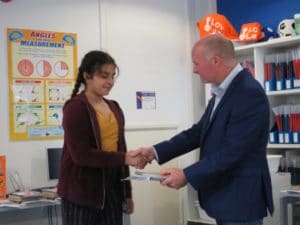
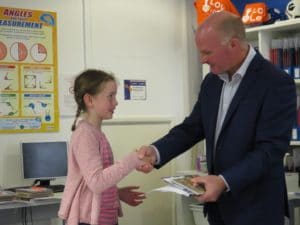
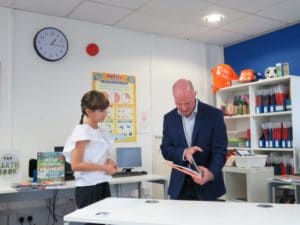

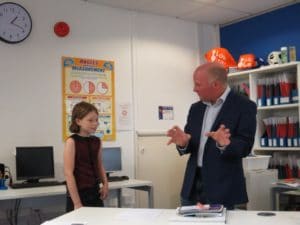


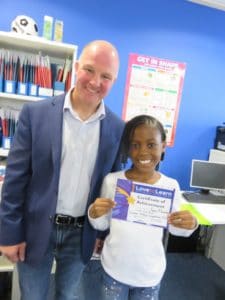

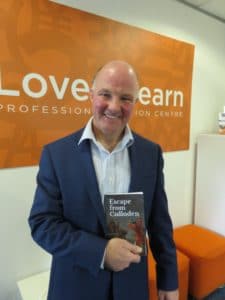
https://www.goodreads.com/author/show/17663881.Justin_Strain
Summer School Pics
Here are some great action shots from our Summer School this August
Our students came to us this August for a whole week of tutoring. We really love teaching summer school as all the students make such great progress and have a great time!
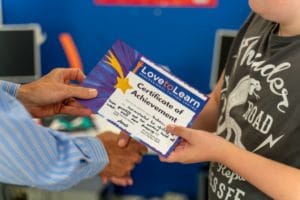


Read more about Summer Learning Loss here……
Summer Writing Competition
I Love Our World
Summer Story Writing
Imagine a setting, near or far. Create characters, human or animal. Describe problems and difficulties they face. Think of ways their problems are solved.
Summer Writing Competition 2019!
Your school could win £100 in book tokens to celebrate if one of your students is the overall winner!
Last year was a great success and we had some wonderful writing from local children. We are keen to repeat this and have invited local author, Justin Strain, to judge this year’s competition for the second year running. His first book, ‘The Secret of the Scarlet Ribbon’, was shortlisted for the, 2018 Times/Chicken House Children’s Fiction Award. He is currently writing the sequel among other novels!
Competition Details
The theme is, ‘I Love Our World’, issues that hi-light caring for the natural world and the problems involved with living in a polluted environment .
Here are the criteria, for Justin to use, to judge the entries;The stories will be judged upon;
1) How children use powerful descriptive language to create their settings and bring their characters to life.
2) How they use narrative structure to develop the plot (including a clear opening, build up, problem, resolution and ending.
3) How their story explores the key theme of caring for our environment – How we can explore ways to love our world.
We have three age categories
- Ages 6 to 7
- Ages 8 to 9
- Ages 10 to 12
Competition Deadline: Entries must be submitted by 7th September.
Entries To: Linda Jones, I Love to Learn Professional Tuition, 3 Beacon House, Cumberland Business Centre, Southsea, PO5 1DS.
Email; tutors@ilovetolearn.co.uk
Winners Announced: Monday 23rd September
Prize Giving: Saturday 28th September at our ‘I Love to Learn Professional Tuition Centre’ in Portsmouth, with Justin Strain.
To help children get started and to encourage them to ‘have a go’ here are some top tips;
Top Tips
- Try and imagine a scene as your character would experience it. Showing the reader what the character; sees, hears, tastes, smells, feels. This can be really powerful.
- Think about how your characters move, speak, and react and write choosing words carefully to explain this.
- Use similes to give readers more information that help you describe your images more fully.
- Break up you story into paragraphs to show a change of place or time. Planning your story will really help.
Lastly, don’t worry too much about spelling as you can edit your writing later on. Enjoy writing and have fun creating your own story!
We are so excited about this opportunity to celebrate creative writing and hope our enthusiasm will inspire local children to write this summer.
Are You Looking for a Tutor?
Find Out About the Service We Provide
Never Stop Learning-Summer Fun
AVOID SUMMER LEARNING LOSS
For most children, summer is a time to leave classes and homework behind. While summer is a holiday from school, it does not have to be a holiday from learning. The summer holiday is great for recharging your children’s batteries, because if they are not using the skills and knowledge that was learned in the classroom, they will find themselves lagging behind when school starts up again.
 When they return to school in September after the long summer break, students can find themselves struggling to catch up. Skills and knowledge gained throughout the school year fade during the summer months. At I Love to Learn, we have found that loss of content retention begins within 24 to 48 hours of learning unless the new information is reinforced or applied immediately. That is why, during summer holidays, even the best students forget some of the lessons they had learned during the school year. After a month without reinforcement, approximately 80 percent of what a student has recently learned can be lost.
When they return to school in September after the long summer break, students can find themselves struggling to catch up. Skills and knowledge gained throughout the school year fade during the summer months. At I Love to Learn, we have found that loss of content retention begins within 24 to 48 hours of learning unless the new information is reinforced or applied immediately. That is why, during summer holidays, even the best students forget some of the lessons they had learned during the school year. After a month without reinforcement, approximately 80 percent of what a student has recently learned can be lost.
Now it is also true that children do need a break to rest and do other things. In fact most learning does rebound after the holiday to overtake the previous level.
For children who have struggled in school, summer is an invaluable opportunity to catch-up on key skills and feel more confident when they return to class. For students who do well, it is an opportunity to keep their enthusiasm for learning high.
Click here to find out about our Summer Lessons…
FUN SUMMER LEARNING TIPS
We never stop learning so here are some ideas to help encourage our children’s learning and have some fun this summer.
Learn about time: allow children to be the family timekeeper and get them to wear a watch every day.
Learn about money: do a car boot sale with your children or they could start their own business (e.g. making and selling lemonade).
Learn about measurement: read recipes, use scales and cook delicious food together.
Learn about the past: by letting them interview grandparents or an elderly neighbour. This can really bring ‘history’ to life.
Improve your writing: by encouraging them to keep a diary every day. Children can maintain their writing skills and capture many memories for the future.
Practice your reading: Take part in the Library Service reading challenge which rewards children for reading a minimum number of books.
Also, as the new school year approaches it may be useful to discuss routines and agree how to organise time, work and anything else which need to be done.
Finally, if they still complain about being bored, try saying “well I guess I haven’t given you enough chores yet!” and see what happens.
Summer Learning Loss can be significant:


 “We had planned to stop the tutoring after the 11+ exam, but with the next lockdown and more disruption to her education, we quickly relented when she literally begged us to continue going! The sessions are adjusted to her needs and she describes them as ‘really fun’ and she likes it that the work is specific to her level and much more individualised than the class work at school.”
“We had planned to stop the tutoring after the 11+ exam, but with the next lockdown and more disruption to her education, we quickly relented when she literally begged us to continue going! The sessions are adjusted to her needs and she describes them as ‘really fun’ and she likes it that the work is specific to her level and much more individualised than the class work at school.”









